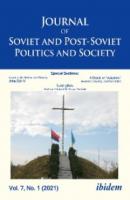Journal of Soviet and Post-Soviet Politics and Society. Группа авторов
Чтение книги онлайн.

Читать онлайн книгу Journal of Soviet and Post-Soviet Politics and Society - Группа авторов страница 10
Название: Journal of Soviet and Post-Soviet Politics and Society
Автор: Группа авторов
Издательство: Автор
Жанр: Зарубежная публицистика
isbn: 9783838276069
isbn:
This is why in these regions the memory of the Ukrainian Insurgent Army is the idealized memory of an organization fighting above all else for Ukraine’s independence. When in 1991 Ukraine declared independence, following the collapse of the USSR, honoring the memory of the UPA was allowed in private ceremonies and at the local government level. Following the Revolution of Dignity, pursuant to a special law passed by the Verkhovna Rada in 2015, the UPA was recognized as a pro-independence organization at the state level. It is worrying that the official narrative most frequently “omits” the dark pages in the history of this organization and the crimes it committed against the civilian population. However, it should be remembered that the underlying motivation behind such an attitude is closely bound up with the memory of Soviet crimes.
1 This research was funded by the National Science Centre (Poland) (decision no. DEC-2012/06/M/HS3/00284).
2 The following publications on the NKVD Internal Troops are worth mentioning: Vnutrennie voiska v Velikoi Otechestvennoi voine 1941–1945 gg. Dokumenty i materialy (Iuridicheskaia literatura, 1975); Ispytannye voinoi. Pogranichnie voiska (1939–1945 gg.) (Granitsa, 2008); T. Cariewskaja, A. Chmielarz, A. Paczkowski, E. Rosowska, and S. Rudnicki (eds.), Teczka specjalna J. W. Stalina. Raporty NKWD z Polski 1944-1946 (Instytut Studiów Politycznych PAN, Instytut Historyczny UW, Oficyna Wydawnicza RYTM, Archiwum Państwowe Federacji Rosyjskiej, 1998); “Osobye papky” Stalina i Molotova pro natsional’no-vyzvol’nu borot’bu v Zakhidniy Ukraini u 1944–1948 rr. Zbirnyk dokumentiv (Piramida, 2010); Grzegorz Motyka, Na białych Polaków obława. Wojska NKWD w walce z polskim podziemiem 1944–1953 (Wydawnictwo Literackie, 2014); and A. Kokurin, N. Petrov, and R. Pikhoia (eds.), Lubianka VChK–OGPU–NKVD–NKGB–MGB–MVD–KGB 1917–1960. Spravochnik (Mezhdunarodnyi Fond Demokratiia, 1997).
3 For more on this subject, see John-Paul Himka, “The Lviv Pogrom of 1941: The Germans, Ukrainian Nationalists, and the Carnival Crowd,” Canadian Slavonic Papers LIII, no. 2–4 (2011): 209–43; Dieter Pohl, Nationalsozialistische Judenverfolgung in Ostgalizien 1941–1944: Organisation und Durchführung eines staatlichen Massenverbrechens (Oldenbourg, 1997); and Dieter Pohl, “Anti-Jewish Pogroms in Western Ukraine,” Shared History—Divided Memory: Jews and Others in Soviet-Occupied Poland, 1939–1941, ed. Elazar Barkan, Elizabeth A. Cole, and Kai Struve (Leipziger Universitätsverlag, 2007), 305–31.
4 The “anti-Polish operation” carried out by the UPA between 9 February 1943 and 18 May 1945 covered several voivodships of the Second Polish Republic, an area that was inhabited by at least one and a half million Poles. The actions of the Ukrainian guerrilla movement resulted in a total of around a hundred thousand individuals being killed. Another between three hundred thousand and four hundred thousand individuals were forced to flee to save their lives. Particularly important publications on the Volhynia-Galicia crime include: Ryszard Torzecki, Polacy i Ukraińcy. Sprawa ukraińska w czasie II wojny światowej na terenie II Rzeczypospolitej (Państwowe Wydawnictwo Naukowe, 1993); Andrzej Leon Sowa, Stosunki polsko-ukraińskie 1939–1947 (Towarzystwo Sympatyków Historii, 1998); Władysław Siemaszko and Ewa Siemaszko, Ludobójstwo dokonane przez nacjonalistów ukraińskich na ludności polskiej Wołynia 1939–1945, vol. 1–2 (Wydawnictwo von Borowiecky, 2000); and Grzegorz Motyka, Od rzezi wołyńskiej do akcji “Wisła.” Konflikt polsko-ukraiński 1943–1947 (Wydawnictwo Literackie, 2011). For more on the history of the region see: Timothy Snyder, Bloodlands: Europe Between Hitler and Stalin (Basic Books, 2010).
5 The literature on the UPA is extensive. During the Cold War, the following studies were written from the perspective of OUN members: Lev Shankovs’kyi, “UPA,” in Istoriya ukrayins’koho wiys’ka 1917–1995 (Svit, 1996); and Petro Mirchuk, Ukrayins’ka Povstans’ka Armiya 1942–1952. Dokumenty i materialy (Cicero, 1953). As a rule, the crimes of the UPA were ignored in these works. The history of this formation was presented in a similar way by many books written in Ukraine after 1991, see e.g. Petro Sodol, Ukrains’ka Povstancha Armiia. Dovidnyk (Proloh, 1994); Ivan Patryliak, Vstan i borys’, slukhay i vir. Ukrains’ke natsionalistychne pidpillia ta povstans’kyi rukh 1939–1960 rr. (Czasopys, 2012); and Anatoliy Rusnachenko, Narod zburenyi. Natsional’no-vyzvol’nyi rukh v Ukraini i natsional’ni rukhi oporu v Bilorusiyi, Lytvi, Latviyi, Estoniyi u 1940–1950-kh rokakh (Universytets’ke vyd-vo “Pulsary,” 2002). Attempts to reconcile the history of the UPA with liberal-democratic values can be found in Iuriy Kyrychuk, Ukrains’kyi natsional’nyi rukh 40-50-kh rokiv XX stolittia: ideolohiia ta praktyka (Dobra sprava, 2003); and Yaroslav Hrytsak, “Tezy do dyskusiyi pro UPA,” in Strasti za natsionalizmom. Istorychni ese (Krytyka, 2004). Among works published outside of Ukraine one should point in particular to: Grzegorz Rossoliński-Liebe, Stepan Bandera: The Life and Afterlife of a Ukrainian Nationalist. Fascism, Genocide, and Cult (ibidem Verlag, 2014); Alexander Statiev, The Soviet Counterinsurgency in Western Borderlands (Cambridge University Press, 2010); Alexander Statiev, “The Strategy of the Organisation of Ukrainian Nationalists in Its Quest for a Sovereign State, 1939–1950,” Journal of Strategic Studies 43, no. 3 (2020): 443–71; Řepa Tomas, Banderovci. Politické souvislosti následky zneužití tématu komunistic-kou propagandou, návaznost na hybridní konf likt v současnosti (Academia, 2019); and Serhiy Kudelia, “Choosing Violence in Irregular Wars: The Case of Anti-Soviet Insurgency in Western Ukraine,” East European Politics and Societies and Cultures 27, no. 1 (February 2013): 149–81.
6 For more on the topic of post-war deportations in western Ukraine see Tamara Vrons’ka, Upokorennia strakhom: simeyne zaruchnytstvo u karal’niy praktytsi radians’koi vlady (1917–1953 rr.) (Tempora, 2013); and Stanisław Ciesielski, Grzegorz Hryciuk, and Aleksander Srebrakowski, Masowe deportacje ludności w Związku Radzieckim (Adam Marszałek, 2004).
7 The 16th, 17th, 18th, 19th, 20th, 21st, 23rd and 24th Motor Rifle Brigades.
8 Dmytro Viedienieiev and Oleksandr Lysenko, “Proiavy teroru i teroryzmu v protystoianni radians’koi vlady ta OUN i UPA v zakhidnoukrains’komu rehioni pisliavoennoi doby,” in V. Lytvyn and V. A. Smolii (eds.), Politychnyi teror i teroryzm v Ukraini. XIX-XX st. Istorychni narysy (Naukowa dumka, 2002), 753.
9 Anatolii Kentii, Ukrains’ka povstans’ka armiia v 1944–1945 rr. (Institut istorii Ukrainy NAN, 1999), 155.